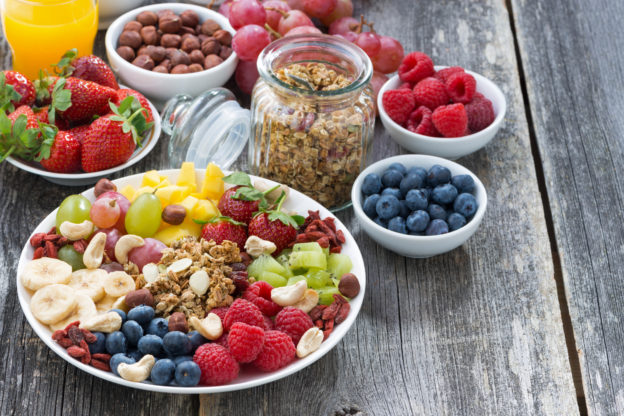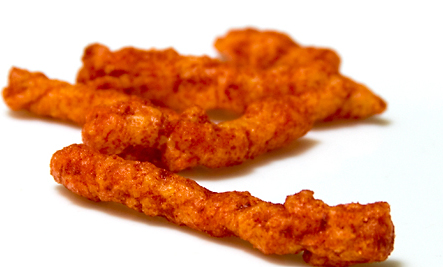The holidays are a time for family, friends – and food! For many people, the many celebrations and holiday meals can severely disrupt the digestive system, causing intestinal discomfort, acid reflux, indigestion, heartburn and more. Neha Sahni, MD, gastroenterologist with Rush Copley Medical Group, provided tips at a recent health talk to keep digestive health in check this holiday season.
Avoid weight gain
Holidays and weight gain often go hand in hand. To avoid gaining weight, caloric intake and energy expenditure should balance. Typically, individuals should consume between 2,000 and 2,500 calories a day, and Dr. Sahni suggests keeping a food diary to calculate intake. To make good choices, be aware of what constitutes a healthy diet. Macronutrients are foods our bodies need in large amounts. She says a healthy diet consists of three primary macronutrients: carbohydrates, proteins and fats. Fiber may also be considered a macronutrient.
Carbohydrates provide your body with energy and should account for 45 to 65 percent of total calorie intake, Dr. Sahni says, noting the type of carbohydrate is important. Whole grains are preferred over refined grains, and high glycemic index foods, such as white rice and pancakes, should be replaced with low glycemic index foods, such as fruits and vegetables. She explains that foods with a high glycemic index are quickly digested and absorbed, causing a rapid rise in blood sugar. Beverages and processed foods which have added sugars should make up less than 10 percent of total calories.
Make healthy choices
Proteins help build and repair tissue, bone, muscle, cartilage, blood, and skin and should comprise 10 to 35 percent of a person’s total caloric intake. Dr. Sahni recommends eating a variety of protein: fish, lean meat, poultry, eggs, beans, peas, nuts and seeds.
Fats should make up 20 to 35 percent of caloric intake, and the type of fat is important. Trans fats – found in margarines, processed foods, crackers, cookies and fast foods – are associated with coronary artery disease and should be kept to less than 10 percent of calories. Unsaturated fats are better choices as they reduce cholesterol, protect against illness and help maintain body temperature. These include avocado, peanut butter, nuts and seeds, fish oil and omega 3 fatty acids.
A daily diet should include 25 to 36 grams per day of fiber as it helps decrease coronary artery disease, stroke and colon cancer. Whole grains found in barley, oatmeal, brown rice, whole wheat breads and pastas are preferred over refined fibers, which include pasta and white breads and white rice.
Alcohol and sweetened beverages
What’s a holiday celebration without a toast? Alcohol should be consumed in moderation, and Dr. Sahni advises no more than one drink per day for women and two drinks per day for men. Moderate consumption may decrease risk of coronary artery disease but increase the risk of breast and colon cancers. Soft drinks and sweetened beverages – including fruit drinks, sports drinks and energy drinks – should be limited as they contain added refined sugar and calories, contribute to weight gain and increase coronary artery disease, diabetes and hypertension. Moderate consumption of coffee – three cups a day – may lower liver or uterine cancers. When drinking juices, Dr. Sahni recommends the kind with pulp for the fiber. Water is always a good choice.
Irritable bowel syndrome and the holidays
Irritable bowel syndrome, or IBS, affects 10 to 15 percent of Americans, but less than half are diagnosed. Symptoms include recurring gut pain or discomfort with diarrhea or constipation or both. IBS is worse over the holidays because of unhealthy foods and stress. Cookies and pies contain artificial sugars which are not good for IBS and cause bloating. Stress increases cortisol which worsens symptoms and doesn’t allow food to digest properly.
Dr. Sahni recommends trying to stick to a routine over the holidays and asking about ingredients in cooked foods. She also suggests people identify triggers for their symptoms. “If meatballs are a trigger, eat smaller portions or avoid them altogether,” she says. “If you are lactose intolerant, keep Lactaid tablets with you. Stay hydrated to prevent constipation. Know your body and don’t overdo it.” Her other recommendations: stay away from caffeine and carbonated beverages (they cause gas and heartburn); drink herbal teas; don’t overeat (it takes four to five hours for food to go through the small intestine); use MiraLAX for constipation and Imodium for diarrhea. Diets low in FODMAPS are an effective therapy for IBS. This FODMAP list recommends which foods to eat and which to avoid if you suffer from IBS.
Avoid acid reflux
Acid reflux symptoms include a burning in the chest or upper abdomen, sore throat, belching, hoarseness and difficulty swallowing. Large meals exacerbate symptoms so she recommends eating four to five smaller meals rather than two to three large ones. Other tips include losing weight and avoiding smoking and trigger foods like spicy and fatty foods, citrus, alcohol, onion, chocolate and caffeine. Do not wear tight clothes or lie down for three hours after eating. When going to bed, use pillows to elevate your head by four to six inches.
Do not use Zantac
Zantac, a drug commonly used to relieve and prevent heartburn, has been recalled and should not be used. Instead, Dr. Sahni says Tums or Pepcid can be used as needed. For more severe cases, Prilosec is available over the counter, but should be taken continuously for at least two weeks, rather than as needed.
Celiac disease
Holiday gatherings can be challenging for people with Celiac disease. Those with this immune disease cannot eat gluten – a protein found in wheat, rye and barley – because it damages the small intestine. Dr. Sahni recommends discussing needs with relatives beforehand and suggests that gluten-free guests should go through buffets first to avoid cross-contamination, take a dish to share with others, and bring a snack or eat before going to a party.
Helpful holiday tips
In general, Dr. Sahni recommends the following tips.
- Be active, get plenty of sleep and control stress.
- Snack wisely.
- Watch portion sizes, use a smaller plate and practice mindful eating.
- Bring a healthy dish to a potluck.
- Limit desserts.
- Weigh yourself daily.
With a little forethought and wise eating, you and your digestive system can enjoy the holidays!








